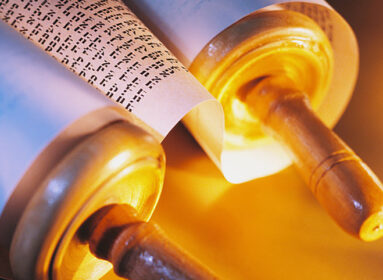
Rabbi Stephen Lewis Fuchs
“For I have hardened his [Pharaoh’s] heart and the hearts of his servants …” – Exodus 10:1
On my list of most frequently asked questions is: Why does God harden Pharaoh’s heart? Why did God not simply “soften” Pharaoh’s heart, show him the error of his ways, and bring about the emancipation of the Hebrews in a peaceful and loving way?
Without question, Pharaoh’s arteriosclerosis is a complex subject. Traditional Jewish commentators point out that, early in the encounters between Moses and Pharaoh, the text states: “Pharaoh’s heart stiffened” (e.g. Exodus 7:22; 8:15), or “Pharaoh became stubborn” (Exodus 8:10; 8:28). Later, beginning with Exodus 9:12, the text begins to say, “The Eternal One stiffened Pharaoh’s heart.”
This shift, according to the commentators, reflects the view that inertia – the unchecked hardening of Pharaoh’s heart (his stubbornness) – took the matter out of Pharaoh’s hands, and evil took on a life of its own.
In Studies in Shemot, Nehama Leibowitz parallels the unchecked acts of evil that Pharaoh committed, to those of Macbeth. At first, Macbeth is reluctant to do wrong. He certainly fears to lay hands on his king, Duncan. With each succeeding murder, though, the voice of his conscience wanes until it can exercise no control over his treacherous impulses.
When in Act III, Lady Macbeth, who first encouraged her hesitant husband to kill the king, voices her reservations about Macbeth’s reign of terror, Macbeth responds: “Things bad begun make strong themselves by ill.” (Act III, Scene 2, line 55). In other words, the evil has taken on a life of its own; Macbeth can no longer control himself. So it was with Pharaoh.
Rabbi Akiba (second century C.E.) foreshadowed Shakespeare’s insight in Macbeth when he described the inclination to do evil this way: “At first it (the inclination to do evil) is like a spider’s thread and at last it is like a rope of a ship” (Genesis Rabbah 22:6).
Rabbi Simeon ben Levi said: “The evil inclination of a person waxes stronger day by day. It seeks to kill him. If God did not help, a person could not overcome it” (B. Kiddushin 30 b).
Implicit in this text is the notion that a person must enlist God’s help to fight the inclination to do evil. God will not do it for us unless we consciously make the effort.
In other words, only through diligent effort and appeal to God for help, can humans overcome the inclination to do wrong. When we persist in evil, when we ignore God’s will, evil takes on strength greater than we can control. Those uncomfortable with such direct references to the Almighty, but who still seek guidance from traditional texts, might choose to substitute, “appeal to the voice of our conscience” for “enlist God’s help.”
In Pirke Avoth (3:19) we find one of Jewish thoughts’ most enigmatic teachings: “All is foreseen. Yet free will is given.” As the rabbis understood God, the Almighty knows exactly what will happen. At the same time, the rabbis uphold the ability of human beings to make moral choices of their own volition. So, for the rabbis, the fact that God announces that the Almighty would harden Pharaoh’s heart (first in Exodus 4:21 and again in 7:3) does not mean that God is responsible for Pharaoh’s evil. The point is that Pharaoh was in no way open to God’s guidance.
God, then, did not actually harden Pharaoh’s heart. God allowed Pharaoh to continue on the course that he had chosen. God allows all of us to do the same. Although most of us, at times, have wished that God would step in and change people, such action would rob us of the free will that gives life meaning.
Rabbi Stephen Fuchs is former director of the World Union of Reform Judaism and rabbi emeritus of Congregation Beth Israel in West Hartford.







 Southern New England Jewish Ledger
Southern New England Jewish Ledger















